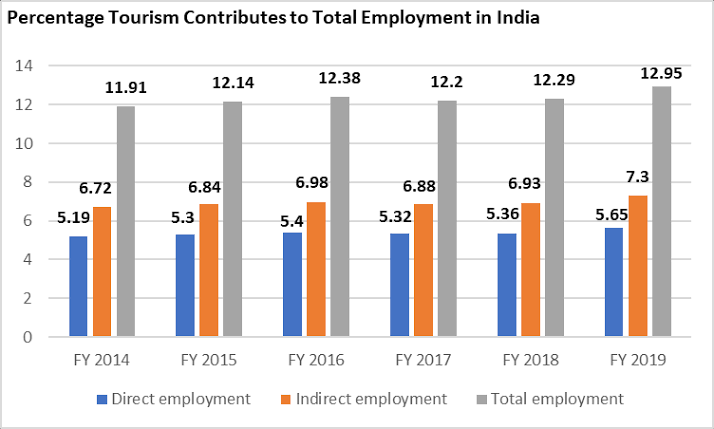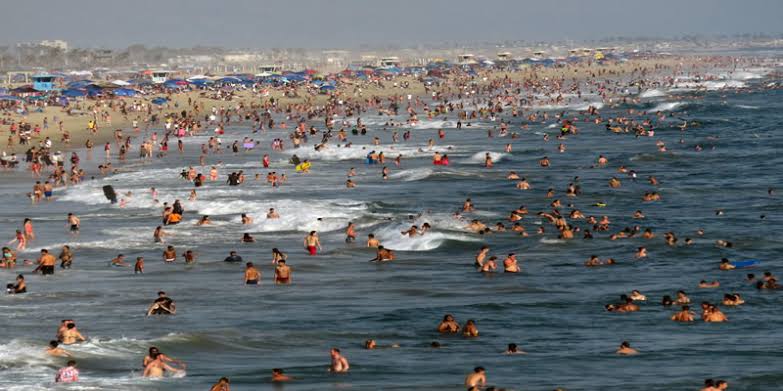Advantages and Disadvantages of TourismIt is the responsibility of the tourism department or organization to make it possible for people to travel to and go on vacation in desired locations. Any nation's tourism industry is one of its most vital sectors. It makes a significant contribution to the economy of a nation because it can generate income all year long. As a result of the tourism industry, many jobs are created, aiding in maintaining a stable employment rate for nations. Tourism can occasionally be a significant source of foreign revenue for the nation. This is similar to the Maldives, where tourism accounts for 40% of the national economy. Not only does this transaction make it easier for tourists to unwind while visiting these areas, but it also helps everyone working in the tourism industry to have a better quality of life. 
Medical tourism has benefited developed nations like the US and the UK. In order to receive treatments that are not available in their home country, people travel to developed nations for medical tourism. These are typically people with poor health care from developing nations. They may also be referred to as medical tourists! Even with all of the advantages of tourism, there are still a number of disadvantages. The tourism industry of that nation occasionally disregards these drawbacks because profit is their only motivation. All aspects of tourism, such as its impact on the environment, financial viability, and sustainability, must be taken into account. We'll explore some of the advantages and disadvantages of tourism presently. Advantages of Tourism1. Economic Growth There is always money coming in, which is one of tourism's main benefits. It is crucial for everyone involved in the travel and tourism industries as well as the overall economy of the nation. As travellers from all over the world fly to a tourist destinations, commercial and private airlines operating out of these nations typically generate huge amounts of revenue. As guests flood hotel lobbies in search of a place to stay, hotels and other lodging establishments in the hospitality sector generate steady income. This ensures that hotels are profitable all year long. All throughout the year, the small industries that fall under the tourism category contribute to the nation's economic growth. Small, developing, and third-world countries are even more in need of this cash flow because, in some cases, the tourism industry is the main driver of their local economies. 2. The Development of a Country The beginning of the wealth influx into the nation aids in the government's ability to raise the money required for the nation's advancement and development. The tourism industry gives the country economic security and stability, preventing it from collapsing during times of crisis. The government also receives the money it needs to carry out significant infrastructure projects, such as building restaurants, hotels, casinos, and theaters, which could boost the tourism industry by giving visitors more places to stay and things to do. This will contribute to an increase in the flow of money. In addition, the country's infrastructure can be improved with the help of this wealth. For both locals and visitors, this entails constructing roads, railroads, better hospitals, and educational facilities. 3. Employment Creation 
People who were previously jobless now have access to a variety of jobs thanks to tourism. Natives who were given regular, dependable jobs have significantly improved their standard of living. Working in places like hotels, restaurants, bars, casinos, theaters, zoos, parks, entertainment venues, and more are included in this list of jobs. Some of those people you might recall from your previous trip, particularly the travel agent who made your reservations, the tour guide who made sure your journey went without a hitch, or the captain of your Caribbean cruise ship. To make sure you have a good time on your vacations, they work tirelessly and away from their families. This has also helped to lower the nation's overall unemployment rate, which lessens the burden on the government. 4. Unification of Various Socities 
Tourism has the special ability to bring together people from various nations, cultures, backgrounds, traditions, and ethnicities who are all travelling to have some fun. It enables visitors to discover the various histories, customs, cultures, cuisines, and ways of life of the countries they visit. This promotes mutual understanding and unification among individuals, which may have long-lasting social effects. As the locals engage with the tourists, cross-cultural relationships are formed that could eventually result in extensive collaborations. 5. Preservation and Protection The historical sites and natural scenery, especially the nation's landmarks, are the main draw for tourists visiting a country. To name a few, these landmarks could be in the form of temples, synagogues, cathedrals, structures, skyscrapers, monuments, parks, and other tourist attractions. In order for the tourism industry to be sustainable, it follows that protecting these sites becomes the government's top priority. The government maintains these areas on a regular basis, and laws are put in place to prevent property damage or vandalism in order to safeguard these locations. Once these areas are integrated into the tourism industry, they become nothing less than a source of income for the nation. 6. Enriches Geographic Identity Globally 
Travelers often rave about their getaways when they return home. Everybody who returns home brags about their wonderful vacation to at least ten more people, usually on social media. This makes the nation more well-known and aids in its efforts to carve out a place for itself on the map while also educating more people about it. Gaining more recognition triggers additional foreign investment and development, which is followed by an uptick in local tourism. 7. Objecting to Stereotypes When you have the chance to travel to another country and experience its culture, you have the chance to learn about new viewpoints and customs and develop a broader, more in-depth, and kinder perspective of the people and places you come across. Stereotypes and perceptions may be replaced by visitors' first-hand observations of the locals. 8. Being More Culturally Sensitive People can observe traditions from various cultures and learn about their manners. It's possible that tourists did not follow the manners and etiquette in their home countries. In some cultures, being impolite involves making noises, showing too much skin, wearing shoes inside, and pointing with your index fingers at the native population. In order to try to avoid offending or acting inappropriately, it is crucial to do some research on the regional customs and traditions before traveling. Experiencing traditions, rituals, festivals, celebrations, and rites can be a wonderful way to learn about the insights of a different culture. The visitor has the opportunity to gain a deeper understanding of the region's cultural heritage. Disadvantages of Tourism1. Tourists' Negligence of the Environment 
When it comes to tourism, thousands or even millions of people may travel somewhere. Particularly in places where tourists are more likely to travel, this high tourist influx has the potential to cause significant environmental damage. The significant increase in tourists is one factor contributing to this environmental burden, but there are several other factors as well that are interrelated and also hurt the environment. These factors include increasing the presence and use of cars, buses, trains, and other vehicles, all of which may contribute to increased carbon emissions. A large number of flights at the airport may also contribute significantly to air pollution. Tourists can contribute significantly to land pollution because they generate a large amount of garbage and waste, the majority of which is non-biodegradable, resulting in a large number of landfills. All of these activities may have a significant impact on the region's environment. Soil erosion, various types of pollution, habitat loss and destruction, and forest fires are just a few of the environmental effects of tourism. If these areas are not properly conserved and cared for, they will lose their natural essence and be abandoned by tourists. This could result in permanent damage to natural tourist attractions! Fortunately, there has been an increase in demand for sustainable tourism. That will be discussed shortly. 2. Exploitation of Local Culture As a result of the large number of tourists visiting their country to observe their unconventional lifestyle and traditions, some countries begin to commercialise their culture. It could be in the form of collectibles. This usually does not offend the locals. However, in some parts of the world, this is considered a disgrace and a mockery of their culture. This is especially true in areas where locals regard their culture as their identity. Commercialization may lead to people simply dressing up and performing traditions to entertain tourists. Seeing how governments are exploiting their culture for profit can make them feel sad and mocked by their country. 3. Tourists' Lack of Compliance Tourists occasionally disrespect the cultures and traditions of the nations and regions they travel to. They might disregard unwritten laws and moral standards that the locals highly value. Sometimes tourists perform horrifying acts while intoxicated in public. As a result, there is some animosity among the locals toward the visiting tourists. The issue could be made worse by racist comments made by tourists and the socioeconomic divide between them and the locals. The tourists might hold the locals in much lower regard than they do. These ideas might drive the visitors to behave erratically and illegally, and occasionally they might even end up making fun of the country. Consider it this way: When you visit a friend's house, you don't just start smashing things or yelling insults at their family. You greet your friend with respect and are happy and upbeat the entire time. When you travel, you should treat locals with respect because you are in their home country. 4. Lack of Job Security/Seasonal only 
Even though we did mention that tourism increases employment rates, depending on the region, some of these jobs may only be available during certain times of the year. This is more of a problem in nations where there are certain times of year when there is a large influx of tourists from all over the world. Therefore, these seasonal jobs provide little in the way of job security, and workers risk being without a proper pension or insurance. 5. Limited to Service-only Jobs Even though tourism creates jobs for locals, the majority of these positions are in the service sector and pay very little. These low-wage, low-skill workers have little interest in promotions or moving up the corporate ladder. 6. Uneven Infrastructure Development Huge amounts of money made from tourism allow nations to develop only the infrastructure of the tourist destination. Unfortunately, the nations don't use the money they make from this infrastructure to build and develop other areas that need upkeep and development. Tourism-related investments receive the majority of the wealth produced by the industry, while areas that urgently need development are consistently overlooked. Locals who don't reside in tourist-heavy areas are ignored, which causes an imbalance in the development of the infrastructure. 7. Foreign Business Owners Sometimes, the majority of the locations where tourists are present are owned by foreign companies. This indicates that the majority of the profits and money entering the nation are being used by foreigners, which results in a sizable loss of local businesses. Local businesses are deprived of the main source of funding that is necessary for them to survive and develop. This could result in businesses failing and losing money, which would harm the nation's economy as a whole. 8. Disregard for Other Sectors When a nation recognizes that tourism is its main source of income, it often ignores the other diverse industries on which it was founded. As a result, these industries become neglected by governments, which hinders their ability to generate revenue, create jobs, and grow. The tourism industry is the one area where the nation intends to concentrate all of its resources, leaving the other sectors to wither and decline. Particularly during times of war, political unrest, or natural disasters, this over-reliance on a single sector for a country's stability can have a significant negative impact because it will result in the long-term closure of that country's tourism industry due to unrest. This may eventually cause the country to collapse because it has no other economic sectors and hasn't built any new ones in a way that would make them resilient to economic downturns. The only industry the country has is tourism, which is the only one that still functions. 9. Wildlife Is Affected Negatively 
Ecological communities, food webs, and keystone species can be harmed by human activity and presence. Others adopt a proactive stance and engage in the tourist activity of hunting exotic animals. By interacting with it, they risk harming native wildlife's natural habitat. These all contribute to the extinction and endangerment of wildlife. 10. Natural Resource Depletion Overconsumption brought on by tourism can result in dwindling natural resources. In areas where there is a lack of food and water, this is especially harmful. This might also cause locals to hate tourists who waste the scarce water supply on luxuries. Water is a natural resource that could be used to fill the Jacuzzis at a five-star hotel, but it would be much better utilized to feed a dehydrated child.
Next TopicAdvantages and Disadvantages of WhatsApp
|
 For Videos Join Our Youtube Channel: Join Now
For Videos Join Our Youtube Channel: Join Now
Feedback
- Send your Feedback to [email protected]
Help Others, Please Share









